| Summary | 2nd WHITRAP World Heritage Dialogue |
| Author:LI Hong, WU Yimeng (Intern), Z PublishDate:2022-08-24 Hits:2089 |
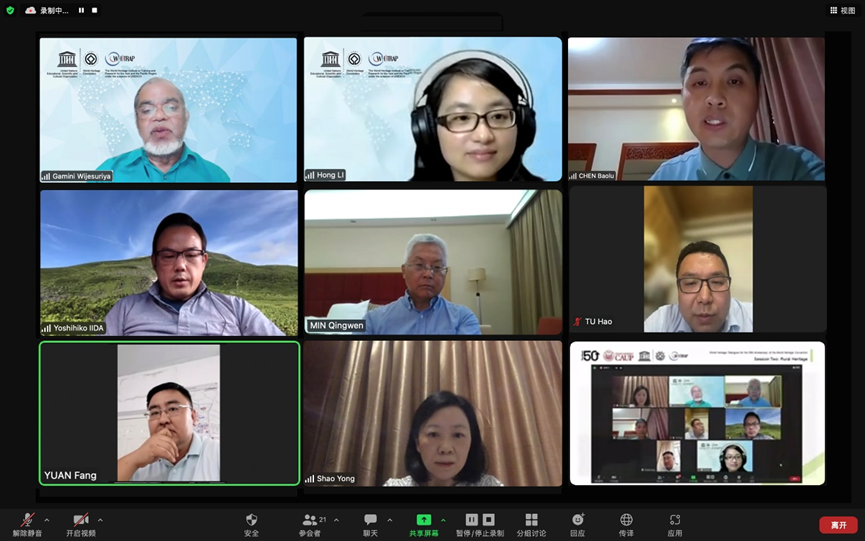 On 27th July, WHITRAP Shanghai and CAUP organized the second session of World Heritage Dialogues on Rural Heritage, as one of the activities to celebrate the 50th Anniversary of the World Heritage Convention. 8 experts were invited to focus on the innovated technology and revitalization tourism of rural heritage. In total 1057 people participated on line. For the video of the activity, please visit: http://heritap.whitr-ap.org/index.php?classid=12497&id=35&t=show SHAO Yong, professor of Tongji University, Dr. Gamini WIJESURIYA, special advisor of WHITRAP Shanghai and Ms. LI Hong, programme specialist of WHITRAP Shanghai, delivered the introduction of relevant background information as the commencement. On behalf of the organizers, Prof. SHAO pointed out that under the influence of factors such as COVID-19, climate change, and regional upheavals, all these activities, including this World Heritage Dialogue, are for the exchanges of experiences of China and the Asia-pacific region to promote the implementation of the relevant policies, programs, and guidelines are of great significance. 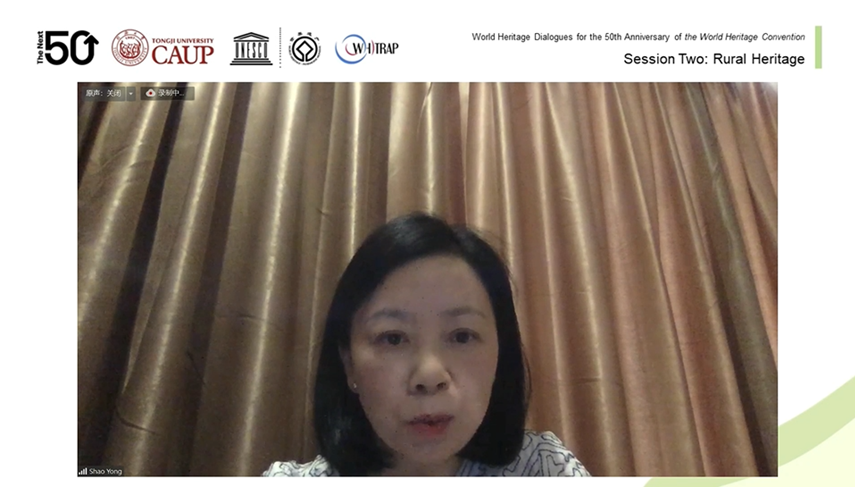 SHAO Yong, professor of Tongji University
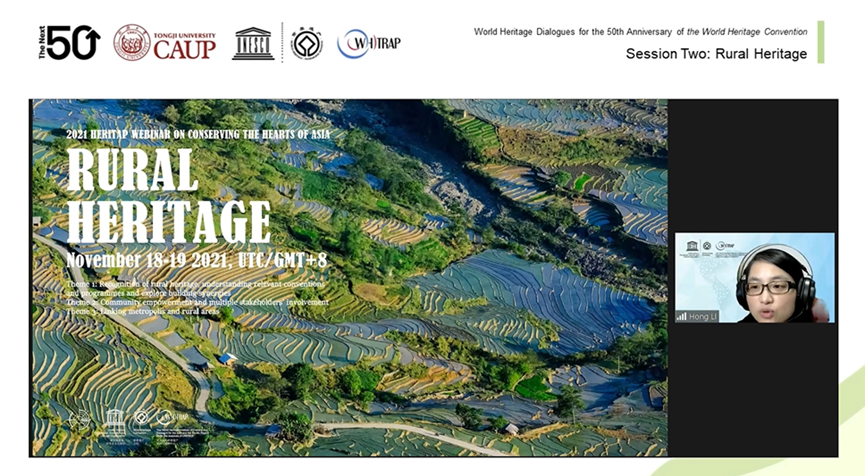 Ms. LI Hong, programme specialist of WHITRAP Shanghai
Dr. WIJESURIYA emphasized that rural heritages are a great source of resilience in the next 50 years and agreed that this chat is a precious opportunity to close some gaps. He first talked about the definition and attributes of rural, and the definition of rural heritage, and echoed LI’s point: firstly, rural heritage inextricably links to the rural context; secondly, rural heritage are dynamic and evolving entities that cannot be separated from one another of frozen in space and time; thirdly, rural heritage is about people’s interaction with nature and sustaining livelihood, and the quality of their life. He then referred to the Convention concerning the Protection of the World cultural and natural heritage, and reviewed the situation in last 50 years. At last, he gave some suggestions regard advisory bodies and national department. Particularly, he mentioned the importance of applying people-centered approach in rural heritage conservation and development. 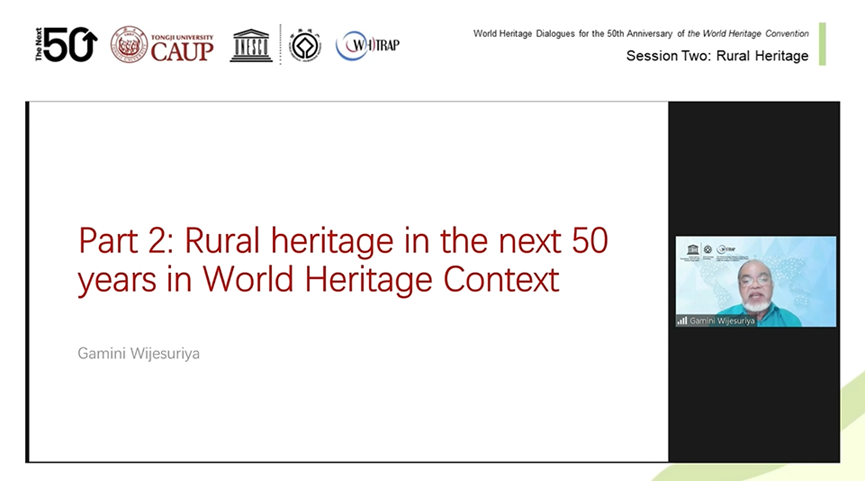 Dr. Gamini WIJESURIYA, special advisor of WHITRAP Shanghai
Under the theme of “Industry revitalization in rural area from the perspective of GIAHS: ideas and practice”, Prof. MIN first introduced GIAHS comprehensively and elaborated the necessity of transitioning to GIAHS under the impact of certain global challenges. Subsequently, he referred to the case of Qingtian Rice-fish Culture System to illustrate that sustainable development of agriculture is the foundation of all other relevant industries. This creative Eco-agricultural system by cultivating rice and field fish varieties that adapt to local natural conditions and realizing multiple harvests in one field and multiple uses of one water, provides rich and diverse products and protects fragile ecosystems as well as derives colorful folk culture, creating sustained and positive impacts on economy, ecology and social culture. Also, Pro. MIN reviewed the changes happening during the past 2 decades based on a theme park in Qingtian for agricultural heritage and reiterated repairing the ecology and preserving the culture. The park, which considered agricultural development as its foundation and purpose, based on retaining traditional agricultural production to promote the development of tourism through ecological and cultural blessing, create more added value and employment opportunities, and bring about the actual improvement of living conditions for local farmers. 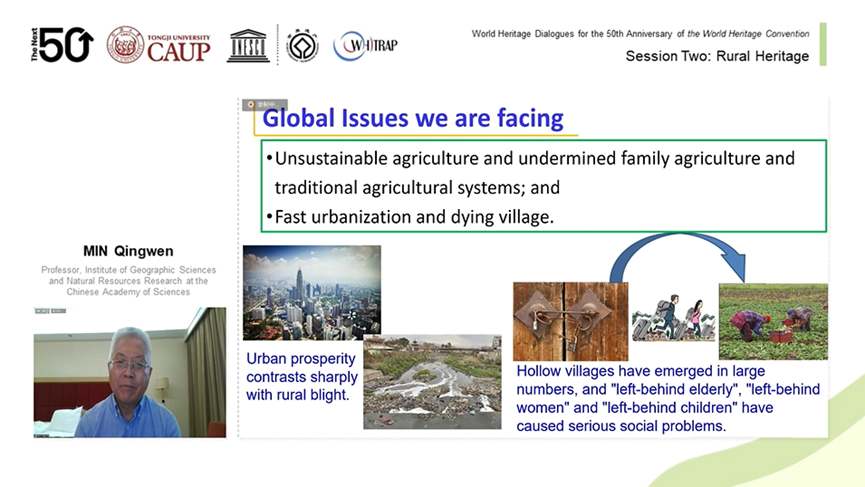 MIN Qingwen, Professor, Institute of Geographic Sciences and Natural Resources Research at the Chinese Academy of Sciences
Mr. CHEN’s speech focused on planning to drive industrial development, thus solving the problem of protection and utilization of rural heritage. Taking Daxi Village, Yongtai Town, Fuzhou City, Fujian Province as an example, he introduced the local development mode of “cultivating local characteristics-coordinated development goals-cultivating key projects”. He also mentioned the remote areas with limited cultural resources. It may be feasible to improve the local organic industry and provide more services through external industries. 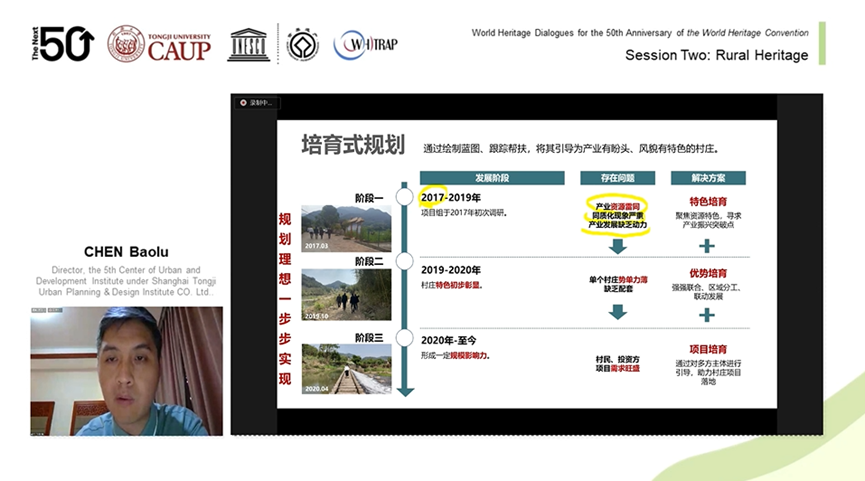 Mr. CHEN Baolu, Director, the 5th Center of Urban and Development Institute under Shanghai Tongji Urban Planning & Design Institute CO. Ltd.
In the next session, three cases, from Xidi town of China, Gokayama of Japan and Yunlong village of China, provoke the panel discussion. Prof. Yoshihiko IIDA, Associate Professor, Heritage Studies Degree Programme and Certificate, Programme on Nature Conservation, University of Tsukuba presented his case of participatory approach on farmland conservation. He introduced the land, agricultural plants, layout, and Tanada (terrace paddy field). He primarily focused on the ownership system as a solution to local aging problems since it is effective in reconnecting stakeholders through/for the conservation. He further predicted that a combination of expanding the ownership system and bringing in new stakeholders might be new lessons for the future. 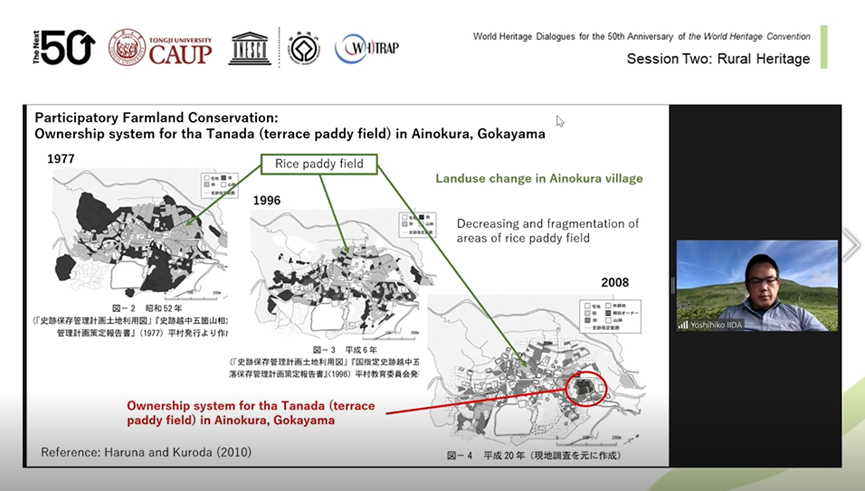 Prof. Yoshihiko IIDA, Associate Professor, Heritage Studies Degree Programme and Certificate Center
Due to the earthquake occurred in Philippines, Prof. SHAO replaced the previous participant shared the case of Yunlong County in Yunnan Province. She mentioned that Yunlong is the counterpart support point of Tongji University. Last year, it successfully lifted itself out of poverty by virtue of the characteristic plateau agriculture and agricultural industrialization and socialization reform. Then, she raised a question concerning rural revitalization: Can we rely on the traditional economy and business patterns to revitalize these rural areas while protecting the heritage? 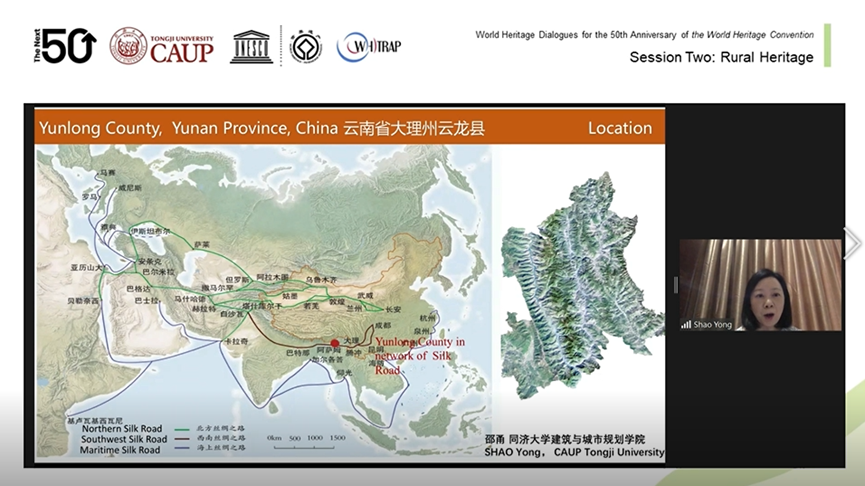 Prof. SHAO additionally shared the case of Yunlong County
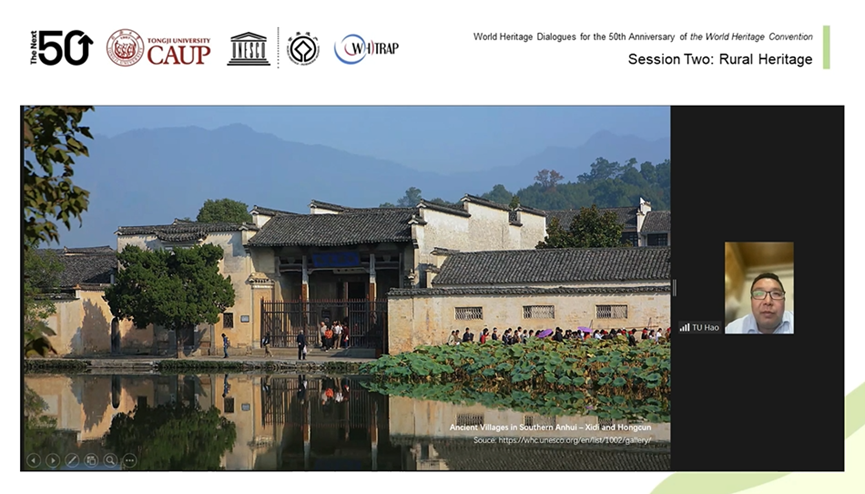 Mr. TU Hao, Deputy Mayor, the People's Government of Xidi Town, Yi County, P. R. China
In the last Q&A session, the guests expressed their views on topics related to the source of rural economy, the transformation of rural industries and the development of rural tourism in response to the questions raised by the audience. In terms of rural economic sources, WIJESURIYA agreed that it is necessary to pay attention to economy as a way of improving people’s life quality. He also appreciated China’s efforts and progress in launching people-centered plans for development and conservation of rural heritages. As a local administrative official in rural areas, TU also emphasized the importance of economic income for rural development, and put forward more detailed ways to ensure the source of villagers' income under the background of COVID-19: firstly, thelocal government have signed agreements to guarantee the at least income of local residents; secondly, they have also developed the business of real estate; last but not the least, they have now provided professional trainings to help local residents sell their products online. SHAO agreed on the necessity and effectiveness of using internet platforms and the e-commerce platforms to promote local products. She particularly supplemented that resilience, defense, and specialty are pivotal in maintaining the competitiveness. With regard tothe transformation of rural industries, MIN responded a question from the audience: A lot of villages have passed industries due to technological evolution or technical requirement. When original way like making charcoal and making salt are no longer used, it’s normal to go with the flow? Prof. MIN answeredtheabove-mentioned questions: he believed that the development of rural industries is a process of continuous renewal and iteration, and it is necessary to put the vitality of local residents in the first place, considered taking different protection measures for different traditional industries to be important, and advocated critically evaluating and distinguishing what needs to be protected and ignored. WIJESURIYA agreed with the third point that the rural is dynamic. Hence, we need to select what to protect. As for the development of rural tourism, although all experts believed that in the long run, tourism can't be a sustainable solution to promote rural development, and after the epidemic, rural tourism needs constant innovation and transformation. Mr. YUAN Fang, Senior Partner, Beijing Pinnacle Zhiye Tourism Cultural and Creative Co., Ltd., believes that the purpose of people's tourism has shifted from sightseeing to relaxation and entertainment in post-pandemic era, so it is very important to make innovations to tourism and maintaining close contact between tourism and rural heritages. For example, boosting consumption in the site, incorporating new technologies to build smart tourism, and involving more real people to interact with tourists. 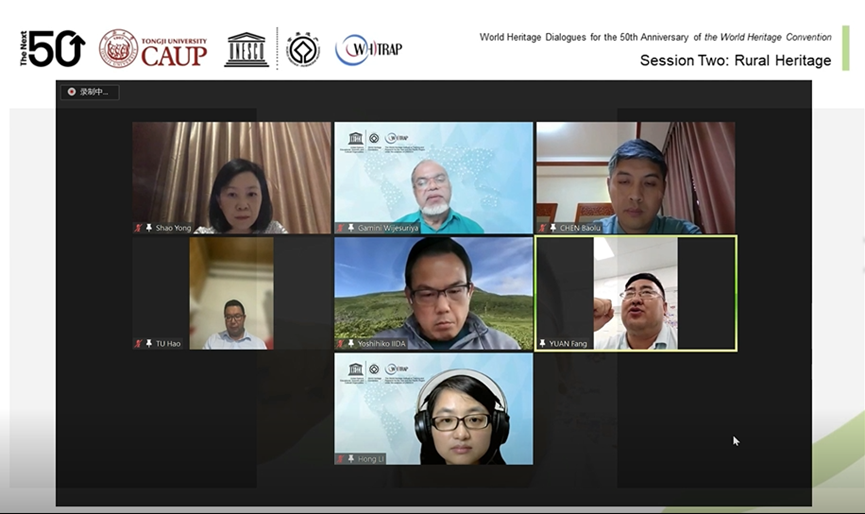 YUAN Fang Senior Partner, Beijing Pinnacle Zhiye Tourism Cultural and Creative Co., Ltd.
CHEN advocated improving the infrastructure of rural tourist destinations, which may not only improve the lives of local residents, but also attract more tourists. SHAO referred to the specific case mentioned in the discussion, and the introduction of new rural tourism technology may attract people to drive to nearby villages, so as to create urbanization and local revenue. At last, all experts answered a question from the chatbox: tourism can't be a sustainable solution in the long run in the future. How to bring back permanent inhabitants and make villages attractive again? What can they invest besides tourism and economy? WIJESURIYA suggested building some innovation systems. IIDA shared a Japanese solution that some local government tried to provide vacant houses in rural areas at a lower price as well as job opportunities to attract urban dwellers and build a more sustainable society. LI pointed out that it might be unnecessary to bring back permanent inhabitants though rural heritages are dynamic. SHAO then referred to the concept of “workation” to prove that people can choose their workplace flexibly. Closing the discussion, Shao summarized the content of this World Heritage Dialogue: firstly, we need to sort out the definition of a rural heritage, and classify which heritage should be protected; secondly, to understand their features, characteristics, and value of heritage better, we should understand the dimension of industry; thirdly, to realize that industry is another key to the usual revitalization. Last but not least, LI, on behalf of WHITRAP Shanghai, thanked the presence and participation of all experts, and strongly appreciated their discussion since it made a significant contribution to promoting the conservation and development of rural heritages.
Contributed by LI Hong, WU Yimeng (Intern), ZHANG Yiwen (Intern), NIU Chenshuang (Intern)
Proofread by PEI Jieting
Translated by PAN Minjie (Intern)
Typeset by JI Zhenjiang (Intern) |
- News | UNESCO’s “World Heritage and Sustainable Tourism Programme” Phase II China Pilot Studies - Yellow (Bohai) Sea Migratory Bird Habitat Phase I Training Course Successfully Held
- WHITRAP's Side Event Adopted by the 46th Session of WH Committee
- Publication | WHITRAP Newsletter No. 62
- News | HeritAP Chat: 2024 World Heritage Contribution to Sustainable Development Goals Successfully Held
- SEAMEO SPAFA-WHITRAP Training Workshop on Heritage Impact Assessment held in Melaka
- Call for Application | 2024 Global Awards for World Heritage Education Innovative Cases(AWHEIC) Promoting what people do and how they do it
Copyright © 2009-2012 World Heritage Institute of Training and Research-Asia and Pacific (shanghai)


